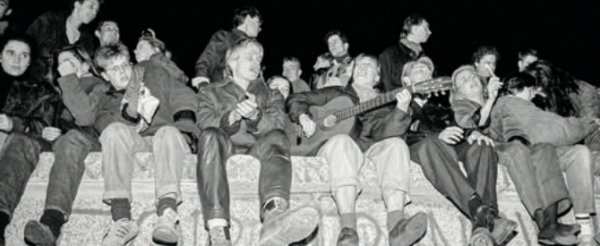The Power of Pop
Thirty years after it soundtracked the fall of the Berlin Wall, pop music is still able to agitate and provoke

By Rob Crossan
September 23 2019
The scenes look vaguely comic now: hordes of young men in stonewash denim, many with fulsome moustaches, cigarette lighters held aloft, clambering over lumps of crumbling concrete on a chilly Berlin evening. At that moment thirty years ago, as The Wall came apart, entry to the West for GDR citizens held out the excitements of economic freedom, liberation from the most closely surveilled state on the planet, and the chance to eat at McDonalds. But to many, one of the true allures of the West was its soundtrack.
In the GDR, with just one state-owned record company,and no official access to new music that wasn’t sanctioned by state ‘listening committees’, music fans would listen, at some risk, to the RIAS station run by the Americans from their sector of Berlin. Groups were secretly formed, and often forcibly disbanded.
In Anna Funder’s book, Stasiland, charting life in the GDR, former East German pop star Klaus Renft recalled how his eponymous group was forced to perform in front of a committee in 1975. The committee’s response was abrupt: “You don’t exist anymore.”But those living within hearing distance of the Berlin Wall could hear the elusive sounds of the free world, whether they wanted to or not. In 1987, crowds gathered on the ‘other’ side of the wall to hear David Bowie playing live. A year later the GDR authorities allowed both Bob Dylan and Bruce Springsteen to play concerts inside East Germany itself. The idea was to use the concerts as a safety valve for frustrated natives; the result was a swell in confidence against the regime, as tens of thousands of East Germans sang ‘Born in the USA’ with The Boss.
None of this could happen now could it? Conventional wisdom suggests that in the era of conveyor-belt pop and the smooth blandishments of Adele and Ed Sheeran, the incendiary days of John and Yoko being wire tapped by the FBI, Marvin Gaye agitating against Vietnam and the Sex Pistols gobbing on the flyblown austerity of 1970s Britain could never be repeated.

Actually, it’s exactly this kind of wobbly thinking that ages us prematurely. If you believe pop music offers no protest these days, it’s likely that you’ve just got older and stopped listening. But do not fear. Help is at almost effortless hand here. Be reassured: Not only is pop music in rude health right now, it’s also every bit as provocative, attritional and statement-making as it ever was.
Even better, social media means pop’s power to provoke to gargantuan global audiences has never been more potent. Matt Healy, frontman of current hottest-band-around, The 1975, recently made global headlines by kissing a male audience member on the lips during a gig in Dubai, in defiance of the UAE’s restrictive laws. Sergei Shnurov, far and away the biggest rock star in Russia today, has long flicked his finger at Vladimir Putin’s regime, most notably by standing in front of the Russian Duma (its parliament) to publicly denounce its stifling of free expression. In Hong Kong, Canto-Pop mega-star Denise Ho has become a full-scale activist, telling a conference in Melbourne in August that citizens of Hong Kong are living in a ‘police state’ and speaking out against the Chinese propaganda machine.
And although Taylor Swift’s lyrics are hardly a call to man the barricades en masse, be in no doubt as to the impact she had upon a younger American demographic when she sang “American glory has faded before me, Now I’m feeling hopeless,” on her latest album.
Last year, Childish Gambino’s hit, ‘This is America’, distilled the issues of gun violence and race relations into a searing blast of anger and confusion. Best of all is rapper Kendrick Lamar’s ‘Alright’, now four years old but perhaps the most forceful piece of anthemic pop for a generation. Its message: For black people to change the world, first they have to survive the present injustices. The “We goin’ be alright!” refrain itself became the soundtrack of the Black Lives Matter movement. It’s the ‘Give Peace a Chance’ for our times, and, like Lennon’s sing-a-long and the best politically-charged hits, it has the combination of antagonistic heft, impeccable craftsmanship and populist appeal that truly has the ability to frighten those who get in the way of the message.
Beyond Ed and Adele, pop still has the power, and can still be the soundtrack to change.
